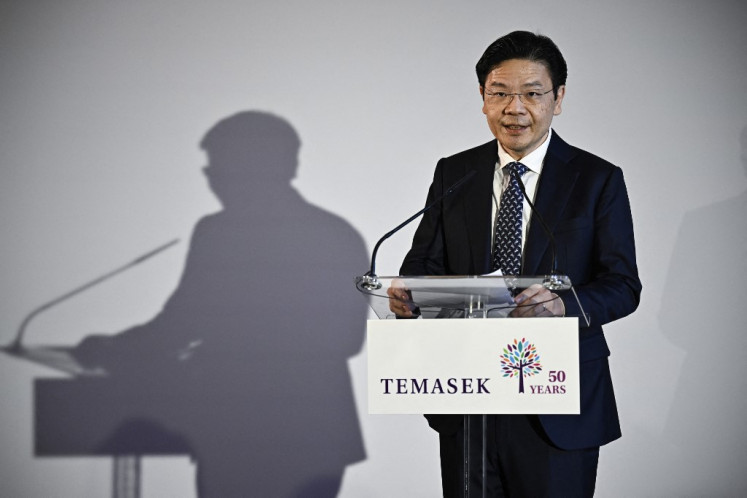Decline in production triggers increase in egg prices after Idul Fitri holiday
It has been quite difficult for Tutik, a warteg (Tegal food stall) owner in Rawa Belong, West Jakarta, to make a profit lately from dishes such as egg balado (egg with spicy sauce) and dadar (traditional omelet), compared to the other dishes in her stall
Change Size

I
t has been quite difficult for Tutik, a warteg (Tegal food stall) owner in Rawa Belong, West Jakarta, to make a profit lately from dishes such as egg balado (egg with spicy sauce) and dadar (traditional omelet), compared to the other dishes in her stall.
An increase in the price of eggs in the past month has meant that Tutik has been unable to make much profit from egg dishes.
Currently, she said, one kilogram of eggs cost Rp 30,000 (US$2.09) in traditional markets, Rp 5,000 higher than the price before and during the month of Ramadhan. However, she has not changed the price of dishes in her warteg.
“We have not increased the price of our dishes,” Tutik said on Tuesday.
The price of eggs increased in the past month, specifically after the long collective Idul Fitri leave.
Historically, the price has gone back down after Idul Fitri, but this year the price has continued to rise.
Trade Minister Enggartiasto Lukita told the press on Monday that there was a mismatch between the supply and demand for eggs.
Extreme weather and a reduction in the use of antibiotics have resulted in a high mortality rate among layer chickens, which has negatively affected production and supply.
Moreover, the extended collective leave has also affected the distribution chain.
“These factors have accumulated and have affected the distribution chain,” said Enggartiasto.
However, Yono, an egg seller at Palmerah Market in Central Jakarta, said demand for eggs had been normal over the past month.
He said he had been informed by his distributor that a decline in production had triggered an increase in the price of eggs.
“This is the longest period that eggs have been at this price. Usually, after [Idul Fitri] the price goes down immediately,” he said, adding that eggs were currently sold for between Rp 29,000 and Rp 30,000, up from the usual range of Rp 24,000 to Rp 25,000.
Indonesia Layer Chicken Association (Pinsar Petelur) chairman Feri said egg production had experienced a 20 percent drop from the usual production of 6,800 tons per day.
There were two main reasons behind the decline in production, he explained, which were the spread of diseases and the use of layer chickens to meet the demand for chicken meat during Idul Fitri.
“Layer chickens have the meat characteristics required to cook opor [chicken stewed in coconut milk], a dish often served during Idul Fitri,” he said.
“In August, [egg stocks] will be back to normal as the young chickens start to grow and breed,” Feri said.
To return production to normal, the association seeks to increase the chicken population to jack up egg supply.
Moreover, chairman of the Association of Poultry Breeding (GPPU), Krissantono, asserted that the long collective Idul Fitri holiday was one of the main reasons for the decline in production.
“Farms were empty from seven days before Idul Fitri until seven days after. The impact of this period of no production on the yield can be felt now,” he said on Monday.
The situation has been exacerbated by bad weather and diseases, which can disturb a chicken’s life cycle.
Minister Enggartiasto warned business players in the industry to decrease egg prices gradually until next week.
If prices did not change within a week, he said, the government intended to intervene in the market by asking big poultry integrators — companies that perform the breeding, hatching, feeding and processing of poultry — to directly sell their egg stocks in markets.
According to Central Statistics Agency (BPS) data, inflation in June stood at 0.59 percent, the lowest inflation during Idul Fitri for the past eight years.
June’s inflation was higher than the 0.21 percent in May, bringing the year-to-date (ytd) inflation to 1.9 percent.
Meanwhile, food prices were up 0.88 percent in June contributing 0.19 percent to overall inflation, with several commodities including fish, chicken, beef and shallots, experiencing price increases.









